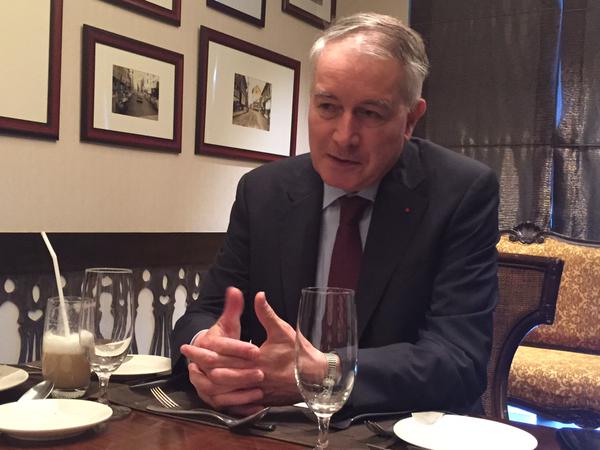
Philippe Zeller, French Ambassador at Large for Climate Negotiations for Asia and Oceania. KRISTINE SABILLO/INQUIRER.net file photo
BANGKOK, Thailand — A French climate envoy Thursday said his country has learned at least one lesson from the failure of the 2009 climate change conference in Copenhagen, Denmark: Rethink the presence of world leaders.
As this year’s host, the French government will likely invite “perhaps 40 or 50” leaders to the start of the climate change summit in Paris later this year, rather than all heads of government to the end of the two-week negotiations. “We do not want to duplicate Copenhagen,” Philippe Zeller, French Ambassador at Large for Climate Negotiations for Asia and Oceania, told Southeast Asian journalists on the sidelines of the Regional Forum on Climate Change held in Bangkok, Thailand.
In 2009, the last time hopes were high that a legally binding climate change agreement may be reached to replace the Kyoto Protocol, Denmark as the host country invited all the heads of government to the last day of the negotiations. That strategy is now understood as having backfired, with key decisions put off until the end and the leaders unable to reach agreement.
A total of 195 countries plus the European Union take part in the negotiations to address the issue of global warming under the United Nations Framework Convention on Climate Change.
Zeller said the French government fully intended the Paris talks to reach an agreement on slowing climate change and reducing greenhouse gas emissions, and that meant leaders should help promote the agreement by addressing the global public at the start of the conference.
“It is useful to have them just before the opening,” he said. “Not at the end of the COP (the Conference of Parties),” Zeller said.
In a separate press conference, Zeller clarified his reference to the plan to tap the leaders near the end of the summit. “We do not speak of errors in Copenhagen,” he said, adding that France was “in solidarity” with Denmark. But he said other parties involved in the climate change negotiations advised the French government to avoid duplicating Copenhagen.
“Paris in itself is not an end. Paris is an opening to the future,” Zeller said.
He said he preferred to use the term “climate disruption” instead of climate change to emphasize the alarming effects of the global phenomenon such as intense typhoons and higher sea levels.
“When you read the IPCC report, the global average temperature could rise to more than four or even five degrees Celsius during the century,” he said. IPCC is the Inter-governmental Panel on Climate Change, which received a Nobel Peace Prize for its work.
He said the term “climate disruption” makes people think of the impact of global waning on health, as well as plants and animals.
Despite a slow start, Zeller said they hope to receive the INDCs of at least 100 countries in the next two months.
As of posting, none of the Southeast Asian nations have submitted their INDCs although President Benigno Aquino III earlier said the Philippines would submit its commitment in August.
One of the aims of the Paris climate talks is to limit global warming to less than two degrees Celsius but Zeller said talking to officials of the Philippines and other Pacific islands makes him agree with others pushing for a revised target of 1.5 degrees Celsius.
Zeller was in Manila last May, a couple of months after Aquino and French President Francois Hollande launched the Manila Call to Action on Climate Change.
“The Philippines is one of our main partners…that is why [we had the Manila Call to Action],” he said.
Zeller said he also visited Singapore, Vietnam, Thailand, Japan, South Korea, China and India as part of his task. JN